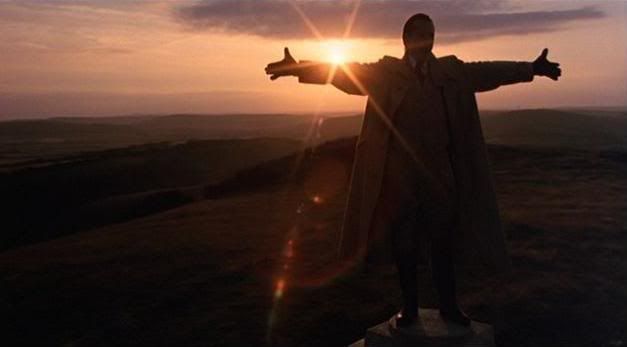How to Get Ahead in Advertising
Thursday, September 09, 2010
In Withnail and I, Bruce Robinson made one of the funniest films there is. Therefore it was always going to be hard for him to make anything that would equal his debut. However, in How to Get Ahead in Advertising he comes mighty close.
The reason why Robinson's second film fails to match Withnail and I is because it’s far too preachy. There are some great speeches in the film; some wonderful digs at consumerism, but occasionally it descends into uninteresting ranting. Yeah consumerism can turn us into unthinking automatons, and yeah big business is greedy, but you don't really need to point it out so blatantly. We already know this. The film works much better when it illustrates the BS or when it jabs at it. It doesn't need to get on its high horse.
One of my favourite bits is when Bagley (Richard E. Grant) – a cocky advertising executive who suddenly loses his magic touch of selling absolute crap when he has to hawk some boil cream – is listening to a bunch of idiots talking about a newspaper article. As a person who makes a living out of lying, he's appalled that they believe what the press tells them. They then begin to argue (there's a great bit when an Irish priest insists that a woman in a vice den had peanut butter smeared across her tits; it was in the paper so it must be true) and the conversation quickly turns to the boil cream that Bagley has become obsessed with. "They're incurable, all of them. I know that and so does everybody else. Until they get one. Then the rules suddenly change." And then he has a dig at the priest. "They want to believe something works. He knows that, which is why he gets a good look-in with the dying." It's a great scene; it's funny as hell and it also has a good point to make. People consume less out of desire and more out of a desperate sort of hope, or even fear; they hope this product or that product will fill the hole in their lives. They hope it will be the answer to all their problems. And thankfully this scene refrains from the preaching that affects the latter stages.
It’s also a devilish idea to have Bagley become obsessed with boils and boil cream. He himself is a boil – as an advertising executive he’s an ugly pimple and highly resistant to any attempts at removal.
But my favourite scene is the one with the psychiatrist – Bagley has quit his job and developed a hideous boil of his own, one that talks to him and one that has grown a face. He's talking to the quack with a big bandage on his shoulder. He rants for a while about the way advertisers have ruined television, and then all of a sudden, after a silence, the boil speaks. The way it's presented in the film, the boil (at first) has a separate voice to Bagley's. He's not portrayed as Gollum with a satanic pimple; he's not talking to himself – the boil is a separate entity. But at the same time you're never really sure whether you're seeing things from Bagley's perspective. He's gone totally crazy, so he may very well be the one saying all this crap. Plus the boil only speaks when Bagley's not looking the other person in the face. But what I love about the scene is the filth the boil speaks and Grant's reactions. His hysteria is hilarious (there's another magnificent bit of hysteria in the film – when the boil first 'speaks', Bagley is so shocked that he runs to the kitchen, shaking and spazzing like he's got St Vitus' dance. Grant is amazing at working himself up into a lather). And then the boil asks Bagley to tell the shrink about his grandfather. "My grandfather was caught molesting a wallaby in a private zoo in 1919." "A wallaby?" "It may have been a kangaroo. I'm not sure." "You mean sexually?" "I suppose so. He had his hand in its pouch." I haven't heard dialogue that funny in a long time.
I also love the scene when Bagley is admitted to hospital to have the boil lanced. By now he's completely raving. He's going on and on about the evils of consumerism. So then the boil says, "You commies don't half talk a lot of shit." Magnificent! It's the sort of argument a Daily Mail reader would give. Criticise capitalism and you must be a Red. However, I can see where the boil is coming from. There are certainly times when Robinson is too militant. Like I said before, he really doesn't need to stand so high on his soapbox. But at the same time the film makes some excellent points. It's just that the film works better when it does it through comedy rather than rhetoric.
Another great scene, one that takes a poke at society's hypocrisy, is when Bagley argues with a feminist who thinks men should bleed. "And I think you're a vegan who eats meat in secret. You see, she doesn't deny it. She's a vegan who eats meat in secret!" "I do not eat meat!" "But you'll eat fish, you'll eat fish until the cows come home." "Fish is allowed!" Of course, this enrages Bagley.
But although hypocritical lefties get a kicking too, the film, early on, raises an interesting point. If you're anti-consumerism, how do you spread your message without advertising? It's a bit of a kick in the teeth, that.
However, Robinson is smart enough to know that consumerism is here to stay. The film doesn't end with any hope. All we can look forward to is more advertising, more spending and more products. The world is one magnificent shop indeed.


0 comments